_J_阿尔弗雷德_普鲁弗洛克的情歌_赏析_英文_
迷茫的情歌 浪漫的追寻——赏析《J.阿尔弗雷德·普鲁弗洛克的情歌》
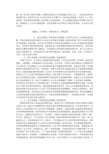
摘要:托马斯·斯特尔那斯·艾略特是英国20世纪影响最大的诗人之一,也是著名的评论家和剧作家,其诸多作品在20世纪甚至对今天都产生了较为深远的影响。
代表作《j.阿尔弗雷德·普鲁弗洛克的情歌》使其获得了更多的殊荣。
本文试图通过简要分析情歌中相关内容,积极探究主人公内心渴望爱情,但是对爱情又存在惧怕心理的矛盾现象,并对该作品进行赏析。
关键词:文学赏析;普鲁弗洛克;诗歌意境《j.阿尔弗雷德·普鲁弗洛克的情歌》在世界文学史上占据着重要的位置,其重点想要表达的是现代人内心的无比空虚以及情感上的相对怯懦。
整个作品的是风格充斥着浪漫主义的因素,这也与作者艾略特早年曾经受法国象征主义诗人拉弗格的深刻影响有关。
该诗属于现代诗歌的范畴,创新地打破了传统诗歌的表现形式和表现手法,甚至没有描述出完整的故事情节和人物特点,单纯依靠文学典故和宗教掌故等片段,将主人公的内心活动生动展现出来,具有较高的文学参考和借鉴价值。
现从意象、抒情、内涵、手法等几个方面,对该作品进行赏析。
一、《j.阿尔弗雷德·普鲁弗洛克的情歌》的意象赏析在整个作品中,诗人将内心的意象和想法形象化,外化为自然界的一些事物,通过时间要素、人物情感、自然现象等予以充分体现。
在作品的一开始诗人就以黄昏这个特殊的时间节点为背景,重点描述主人公在参加聚会路途中所遇到的种种景物,这也是作者第一次浓墨重彩的开始意象的写作手法。
众所周知,黄昏不论是在西方国家还是在东方国家都有着相似的含义,那就是寓意着即将结束和了无生机,作者将黄昏作为开场的背景具有其深刻的内涵,表现出文中主人公的心情的混沌以及复杂,折射出整个世界也处于一片混沌的状态。
黄昏作为白天和黑夜的交界处,也寓意着两种自然状态的互相抗衡和博弈,表现出主人公思想在两者之间的徘徊和斗争,也为下步展现出主人公的心理情感打下铺垫。
之所以起名叫做情歌,肯定是有对女性表达主人公的爱慕之情。
《阿尔弗雷德·普鲁弗洛克的情歌》主题探析
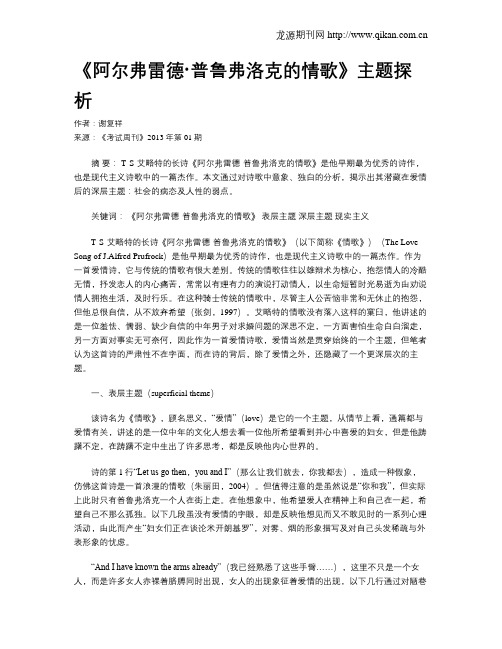
《阿尔弗雷德·普鲁弗洛克的情歌》主题探析作者:谢复祥来源:《考试周刊》2013年第01期摘要: T·S·艾略特的长诗《阿尔弗雷德·普鲁弗洛克的情歌》是他早期最为优秀的诗作,也是现代主义诗歌中的一篇杰作。
本文通过对诗歌中意象、独白的分析,揭示出其潜藏在爱情后的深层主题:社会的病态及人性的弱点。
关键词:《阿尔弗雷德·普鲁弗洛克的情歌》表层主题深层主题现实主义T·S·艾略特的长诗《阿尔弗雷德·普鲁弗洛克的情歌》(以下简称《情歌》)(The Love Song of J.Alfred Prufrock)是他早期最为优秀的诗作,也是现代主义诗歌中的一篇杰作。
作为一首爱情诗,它与传统的情歌有很大差别。
传统的情歌往往以雄辩术为核心,抱怨情人的冷酷无情,抒发恋人的内心痛苦,常常以有理有力的演说打动情人,以生命短暂时光易逝为由劝说情人拥抱生活,及时行乐。
在这种骑士传统的情歌中,尽管主人公苦恼非常和无休止的抱怨,但他总很自信,从不放弃希望(张剑,1997)。
艾略特的情歌没有落入这样的窠臼,他讲述的是一位羞怯、懦弱、缺少自信的中年男子对求婚问题的深思不定,一方面害怕生命白白溜走,另一方面对事实无可奈何,因此作为一首爱情诗歌,爱情当然是贯穿始终的一个主题,但笔者认为这首诗的严肃性不在字面,而在诗的背后,除了爱情之外,还隐藏了一个更深层次的主题。
一、表层主题(superficial theme)该诗名为《情歌》,顾名思义,“爱情”(love)是它的一个主题,从情节上看,通篇都与爱情有关,讲述的是一位中年的文化人想去看一位他所希望看到并心中喜爱的妇女,但是他踌躇不定,在踌躇不定中生出了许多思考,都是反映他内心世界的。
诗的第1行“Let us go then,you and I”(那么让我们就去,你我都去),造成一种假象,仿佛这首诗是一首浪漫的情歌(朱丽田,2004)。
The Love Song of J. Alfred Prufrock赏析

As the poem uses the stream of consciousness technique, it is often difficult to determine what is meant to be interpreted literally or symbolically. In general, Eliot uses imagery which is indicative of Prufrock's character, representing aging and decay. For example, "When the evening is spread out against the sky / Like a patient etherized upon a table" (lines 2-3), the "sawdust restaurants" and "cheap hotels," the yellow fog, and the afternoon "Asleep...tired... or it malingers" (line 77), are reminiscent of languor and decay, while Prufrock's various concerns about his hair and teeth, as well as the mermaids "Combing the white hair of the waves blown back / When the wind blows the water white and black," show his concern over aging.
《J.阿尔弗莱德·普鲁弗洛克的情歌》赏析艾略特
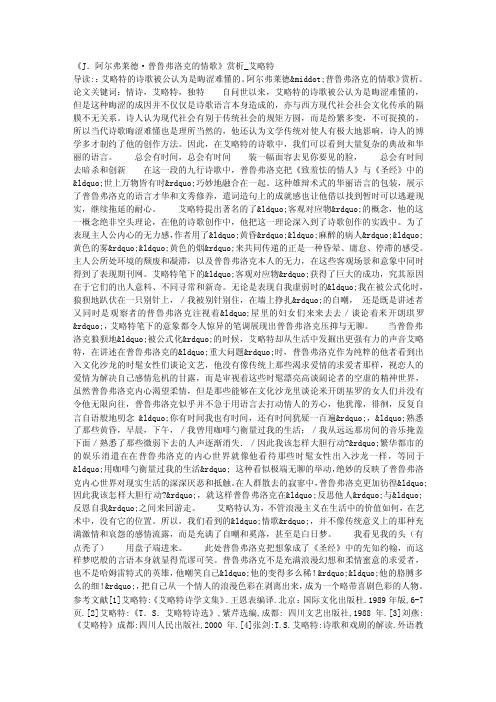
《J.阿尔弗莱德·普鲁弗洛克的情歌》赏析_艾略特导读::艾略特的诗歌被公认为是晦涩难懂的。
阿尔弗莱德·普鲁弗洛克的情歌》赏析。
论文关键词:情诗,艾略特,独特自问世以来,艾略特的诗歌被公认为是晦涩难懂的,但是这种晦涩的成因并不仅仅是诗歌语言本身造成的,亦与西方现代社会社会文化传承的隔膜不无关系。
诗人认为现代社会有别于传统社会的规矩方圆,而是纷繁多变,不可捉摸的,所以当代诗歌晦涩难懂也是理所当然的,他还认为文学传统对使人有极大地影响,诗人的博学多才制约了他的创作方法。
因此,在艾略特的诗歌中,我们可以看到大量复杂的典故和华丽的语言。
总会有时间,总会有时间装一幅面容去见你要见的脸,总会有时间去暗杀和创新在这一段的九行诗歌中,普鲁弗洛克把《致羞怯的情人》与《圣经》中的“世上万物皆有时”巧妙地融合在一起。
这种雄辩术式的华丽语言的包装,展示了普鲁弗洛克的语言才华和文秀修养,遣词造句上的成就感也让他借以找到暂时可以逃避现实,继续拖延的耐心。
艾略特提出著名的了“客观对应物”的概念,他的这一概念绝非空头理论,在他的诗歌创作中,他把这一理论深入到了诗歌创作的实践中。
为了表现主人公内心的无力感,作者用了“黄昏”“麻醉的病人”“黄色的雾”“黄色的烟”来共同传递的正是一种昏晕、庸怠、停滞的感受。
主人公所处环境的颓废和凝滞,以及普鲁弗洛克本人的无力,在这些客观场景和意象中同时得到了表现期刊网。
艾略特笔下的“客观对应物”获得了巨大的成功,究其原因在于它们的出人意料、不同寻常和新奇。
无论是表现自我虚弱时的“我在被公式化时,狼狈地趴伏在一只别针上,/我被别针别住,在墙上挣扎”的自嘲,还是既是讲述者又同时是观察者的普鲁弗洛克注视着“屋里的妇女们来来去去/谈论着米开朗琪罗”,艾略特笔下的意象都令人惊异的笔调展现出普鲁弗洛克压抑与无聊。
论艾略特的《J·阿尔弗雷德·普鲁弗洛克的情歌》

论艾略特的《J·阿尔弗雷德·普鲁弗洛克的情歌》2019-08-16内容摘要:《J·阿尔弗雷德·普鲁弗洛克的情歌》是美国20世纪初杰出诗⼈T·S·艾略特的早期重要作品,被公认为英美现代派的第⼀部诗歌杰作。
诗歌表⾯是在讲述⼀个性格懦弱的单⾝汉普鲁弗洛克始终没有勇⽓向⼼上⼈求爱的故事,实则通过对⼈物普鲁弗洛克的形象描写来反映当时⼈们的⼼理状态,揭⽰现代西⽅⼈精神空虚、迷茫、焦虑、异化的主题。
诗⼈以⼀曲求爱情歌为读者谱写了现代⽂明的悲歌。
关键词:《J·阿尔弗雷德·普鲁弗洛克的情歌》 T·S·艾略特悲歌精神空虚焦虑艾略特,⼆⼗世纪英美⽂坛上⼀颗耀眼的明星,其所创作的诗歌及提出的新批评⽂学理论对英美现代派诗歌的形成及审美标准的确⽴起了极其重要的作⽤,开创了长达25年之久的“艾略特时代”。
正如张剑评论道:“他的到来改变了英国⽂学的现存秩序,他的诗歌和⽂学批评改变了整个⼀代⼈的⽂学趣味,创⽴了⼀整套新的鉴赏标准[1]。
”《J·阿尔弗雷德·普鲁弗洛克的情歌》(以下简称“情歌”)作为艾略特最重要的早期作品之⼀,起初在伦敦并不为⽂学界所接受,甚⾄受到蔑视。
哈洛德·门罗认为它“完全不正常”[2],但庞德却给予了它很⾼的赞誉,称之为他“近年来所读到的最好的情歌”[3]。
不可否认的是《情歌》以其主题、风格和语⾔技巧的新颖独特突破了长期以来占统治地位的传统诗歌形式,开创了英美现代派诗歌的新纪元,标志着艾略特已经完全转向了现代主义诗歌。
其写于1910―1911年间,当时整个社会正处在第⼀次世界⼤战前⼣,局势动荡不安,现代都市⼈精神世界濒临崩溃,整个世界陷于⼀⽚混乱的⽆序状态。
⽽诗中的普鲁弗洛克正是这⼀典型西⽅现代都市⼈的代表,在理想和现实之间徘徊,懦弱,空虚,迷茫。
⽽且正如布鲁克斯指出的:《情歌》主要不是关于个⼈和个别城市的苦境,⽽是关于⼀个时代和西⽅⽂明的苦境[4]。
在钉针下趴伏的爱——《J·阿尔弗瑞德·普鲁弗洛克的情歌》解读

德・ 普鲁弗洛克的情 歌 ( 下简称 情 歌》 以 )便是其这一时
期 的代表作品,发表于 1 I 9 5年,实际创作于 l l-9 年 901I 1 间。当时正值第一次世界大战前夕 , 欧美整个社会 局势动荡 不安 , 社会矛盾 日益尖锐 , 现代都市人的道德理想与精神价 值正面临着空前 的危机 ,入际关系支离破碎 , 人们对前途感 到悲观迷惘 , 情歌> )用内心独 自表现主 人公普鲁弗洛克渴
巷, 也不会想着要带 自己心仪 的对 象去到满 目疮痍的下等旅
店或者一见就毫无情 调毫无 食欲 的大排档、小饭馆 , 更何况 普鲁弗洛克是一位穿 “ 晨礼 服” ,系 “ 领带”的上流社会的
知识分子 ! 跟所有的绅士一样 ,普鲁弗洛克从一开始也要
制造浪漫情境 ,想带 自己心仪 的人一起走 , 离开这无聊的人
是诗人 , 的家庭一直保持新英格兰加尔文教派 的传统 。 他 艾
略特 认 为 自 己在政 治 上是 保 皇 党 ,宗 教 上 是英 国天 主 教 徒 ,
一
普 鲁 弗洛克 对爱 的渴望
文学上是古典主义者 。他的早期作品情 调低沉 ,通过联想、
隐喻、暗示等各种手段 ,表现现代人的苦闷 , J阿尔 弗瑞 ・
诗歌一开始 , 其实普鲁弗洛克就有 了表白的冲动,或者
说在 自己内心历练几百回之后 ,他发出 了邀请,“ 那么我们 走吧,你我两个人” 我们走吧 ,穿过一些半冷清 的街” ,“ 。
我们且不去追究这些所谓的表白是不是真 的已经兑现 , 或者 是否已经为对方所听见 , 毕竟普鲁弗洛克作为一位绅士 , 作 为一个有知识有 身份 的上流社会 人士有想法要带 自己心爱 的人 “ 穿过一些半冷清的街” ,逃 离那 “ 喋喋人声” 下等 、“ 旅 店” 以及“ 满地牡蛎壳的小饭馆” 这 怎么能说他 “ , 无情 ” ?
【美联英语】双语阅读:阿尔弗瑞德普鲁弗洛克的情歌
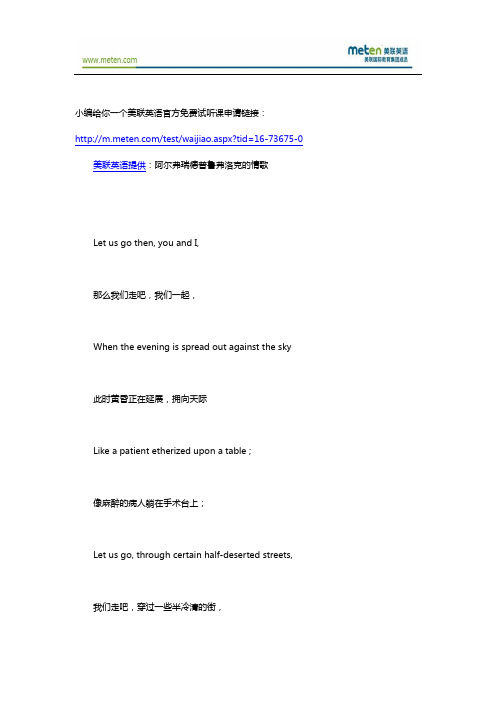
小编给你一个美联英语官方免费试听课申请链接:/test/waijiao.aspx?tid=16-73675-0美联英语提供:阿尔弗瑞德普鲁弗洛克的情歌Let us go then, you and I,那么我们走吧,我们一起,When the evening is spread out against the sky此时黄昏正在延展,拥向天际Like a patient etherized upon a table ;像麻醉的病人躺在手术台上;Let us go, through certain half-deserted streets,我们走吧,穿过一些半冷清的街,The muttering retreats那儿休憩的场所正人声喋喋;Of restless nights in one-night cheap hotels 有夜夜不宁的便宜歇夜旅店And sawdust restaurants with oyster shells: 露天的餐馆里牡蛎壳遍地,Streets that follow like a tedious argument 街连着街,好像一场冗长的争议Of insidious intent怀着阴险的目的To lead you to an overwhelming question ...要把你引向一个重大的问题……Oh,do not ask, "What is it?”哦,别问“是什么?”Let us go and make our visit.让我们去走访一遍。
In the room the women come and go客厅里女人来来回回穿梭,Talking of Michelangelo.正在谈论着米开朗基罗The yellow fog that rubs its back upon the window panes, 黄色的雾在窗玻璃上擦着它的背,The yellow smoke that rubs its muzzle on the window panes 黄色的烟在窗玻璃上擦着它的嘴,Licked its tongue into the corners of the evening,它的舌头伸进黄昏的角落,舔过以后Lingered upon the pools that stand in drains,就在干涸的水池上面徘徊。
艾略特诗歌《普鲁弗洛克的情歌》原文及赏析

艾略特诗歌《普鲁弗洛克的情歌》原文及赏析(最新版)编制人:__________________审核人:__________________审批人:__________________编制单位:__________________编制时间:____年____月____日序言下载提示:该文档是本店铺精心编制而成的,希望大家下载后,能够帮助大家解决实际问题。
文档下载后可定制修改,请根据实际需要进行调整和使用,谢谢!并且,本店铺为大家提供各种类型的经典范文,如诗歌散文、原文赏析、读书笔记、经典名著、古典文学、网络文学、经典语录、童话故事、心得体会、其他范文等等,想了解不同范文格式和写法,敬请关注!Download tips: This document is carefully compiled by this editor.I hope that after you download it, it can help you solve practical problems. The document can be customized and modified after downloading, please adjust and use it according to actual needs, thank you!In addition, this shop provides you with various types of classic sample essays, such as poetry and prose, original text appreciation, reading notes, classic works, classical literature, online literature, classic quotations, fairy tales, experience, other sample essays, etc. if you want to know the difference Please pay attention to the format and writing of the sample essay!艾略特诗歌《普鲁弗洛克的情歌》原文及赏析【导语】:要是我相信我在回答的是个能够回到阳世的人, 这火焰就不再抖动。
《J·阿尔弗瑞德·普鲁弗洛克的情歌》三种译文比较

内容提要: 本文对T ·S·艾略特的成名作《J ·阿尔弗瑞德·普鲁弗洛克的情歌》的三个影响较大的汉译本进行了比较研究。
本文的讨论从两方面展开: 一是对照原文分析各种译本中的“误读”; 二是对照不同译本阐述翻译的“再创造”与译者主体性的关系。
关键词:《J·阿尔弗瑞德·普鲁弗洛克的情歌》翻译误读主体性《J ·阿尔弗瑞德·普鲁弗洛克的情歌》(T he L ove S ong of J. A lf red P ruf rock ) (以下简称《情歌》) 是艾略特早期最重要的作品, 在我国也产生了广泛的影响。
本文拟就《情歌》在国内影响较大的三个汉译本进行比较研究。
这三个译本分别是查良铮译本(简称 A 译)、裘小龙译本(简称 B 译) 和汤永宽译本(简称 C 译)。
①我们参照的原文版本是公认的权威版本《T ·S·艾略特诗歌和戏剧全集》(T he Comp lete P oem s and P lay s of T. S. E liot)。
②一《情歌》是一篇以“我”的口吻讲述的“戏剧独白”。
“我”就要去“约会”情人, 希望向她表达爱, 但却疑虑重重, 深恐遭到拒绝, 因此,“我”畏缩不前, 一直在痛苦的矛盾中煎熬。
诗人将主人公与哈姆莱特、米开朗琪罗等英雄人物相比, 进一步衬托出他的卑微与无能。
在诗歌创作技巧上, 诗人也进行大胆创新, 不但发展了布朗宁的“戏剧独白”, 而且还运用了反讽、自由联想、突降、跨行、奇喻、叠句、首语重复、不规则的韵脚等多种手法“道出了他内心深处的迷惘、忧郁和本能的爱欲”(黄宗英45)。
从翻译的基本原则看, 语际间的翻译首先应该讲究“忠实”和“通顺”。
这里的“忠实”是指译作在意义和艺术风格传达上要忠实于原作;“通顺”是指译作在表达上应该语句通顺, 合乎译入语习惯。
这两者是文学翻译的最基本的要求。
the love song of j. alfred prufrock赏析(J.艾尔弗雷德普鲁弗洛克的情歌赏析)
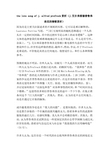
the love song of j. alfred prufrock赏析(J.艾尔弗雷德普鲁弗洛克的情歌赏析)因为诗是主要关注叙述者的不规则的冥想,它可以是难以解释的。
Laurence Perrine写道,“[诗]呈现明显的随机思维通过一个人的头在一定的时间间隔,其中的过渡环节是心理上的而非逻辑”。
这种文体的选择使我们很难准确地确定什么是字面意义,什么是符号性。
表面上,“J.艾尔弗雷德普鲁弗洛克情歌》继电器性失意的中年男子想说些什么,但害怕这样做的想法,最终不。
然而,争议,在于Prufrock 是谁说的,不管他是真的去任何地方,他想说什么,和什么各种图像参考。
预期的观众不明显。
有些人认为,诗跟另一个人或直接对读者,而另一些人认为Prufrock的独白是内部。
珀赖因写道:“我和你”的第一行分Prufrock本性的部分,[ 16 ]而Mutlu Konuk Blasing认为,“你和我”指的是人物的困境与作者之间的关系。
[ 20 ]同样,评论家的争议是否普鲁弗洛克去某处的诗中。
在这首诗的前半部分,普鲁弗洛克使用各种户外图像(天空、街道、便宜的餐馆和酒店,雾),并讨论如何将在“以面包和茶”对各种事情的时间,和“时间回身走下楼梯。
”这使得很多相信普鲁弗洛克的途中一个下午茶,在他正准备问这个“巨大的问题”。
其他人,然而,认为诗是不去任何地方,而是在通过它在他的脑海。
或许最重要的争论是在“重大的问题”,是想问他的。
许多人认为,诗是想告诉他的一个在她的浪漫兴趣的女人,指着各种女性的武器和服装的最后几行,诗感叹图像,美人鱼不会唱歌给他听。
其他人,然而,认为普鲁弗洛克试图表达一些更深层次的社会哲学洞察力或幻灭,但害怕拒绝,指着语句表达幻灭与社会如“我量我的生活用咖啡匙”(51行)。
许多人认为,这首诗是一个时代的社会批判和普鲁弗洛克的困境是无法过一个有意义的存在,在现代世界。
麦考伊和Harlan写道“在上世纪20年代的许多读者,诗似乎概括了现代人的无奈和无能。
The Love Song of J Alfred Prufrock赏析

(But in the lamplight, downed with light brown hair!) (可是在灯光下,显得淡褐色毛茸茸!)
Is it perfume from a dress 是否由于衣裙的香气 That makes me so digress? 使得我这样话离本题?
Arms that lie along a table, or wrap about a shawl. 那些胳膊或围着肩巾,或横在案头。
And indeed there will be time 呵,确实地,总会有时间 For the yellow smoke that slides along the street, 看黄色的烟沿着街滑行, Rubbing its back upon the window-panes; 在窗玻璃上擦着它的背; There will be time, there will be time 总会有时间,总会有时间 To prepare a face to meet the faces that you meet; 装一副面容去会见你去见的脸; There will be time to murder and create, 总会有时间去暗杀和创新, And time for all the works and days of hands 总会有时间让举起问题又丢进你盘里的 That lift and drop a question on your plate; 双手完成劳作与度过时日; Time for you and time for me, 有的是时间,无论你,无论我 And time yet for a hundred indecisions, , 还有的是时间犹豫一百遍, And for a hundred visions and revisions, 或看到一百种幻景再完全改过, Before the taking of a toast and tea. 在吃一片烤面包和饮茶以前。
TheLoveSongofJ.AlfredPrufrock中英全文对照

The Love Song of J. Alfred Prufro ckT.S.Eliot1.S’iocredes se che mia rispos ta fosse2. A person a che mai tornas se al mondo,3.Questa fiamma staria senzapiu scosse.4.Ma percio cchegiamma i di questo fondo5.Non tornovivo alcun,s’i’odoilv ero,6.Senzatemad’infami a ti rispon do.7.Let us go then, you and I,8.When the evenin g is spread out agains t the sky9.Like a patien t etheri zed upon a table;10.Let us go, throug h certai n half-desert ed street s,11.The mutter ing retrea ts12.Of restle ss nights in one-nightcheaphotels13.And sawdus t restau rants with oyster-shells:14.Street s that follow like a tediou s argume nt15.Of insidi ous intent16.To lead you to an overwh elmin g questi on ...17.Oh,donotask,“Whatisit?“18.Let us go and make our visit.19.In the room the womencome and go20.Talkin g of Michel angel o.21.The yellow fog that rubs its back upon the window-panes,22.The yellow smokethat rubs its muzzle on the window-panes,23.Licked its tongue into the corner s of the evenin g,24.Linger ed upon the poolsthat standin drains,25.Let fall upon its back the soot that fallsfrom chimne ys,26.Slippe d by the terrac e, made a sudden leap,27.And seeing that it was a soft Octobe r night,28.Curled once aboutthe house, and fell asleep.29.And indeed therewill be time30.For the yellow smokethat slides alongthe street,31.Rubbin g its back upon the window-panes;32.Therewill be time, therewill be time33.To prepar e a face to meet the facesthat you meet;34.Therewill be time to murder and create,35.And time for all the worksand days of hands36.That lift and drop a questi on on your plate;37.Time for you and time for me,38.And time yet for a hundre d indeci sions,39.And for a hundre d vision s and revisi ons,40.Before the taking of a toastand tea.41.In the room the womencome and go42.Talkin g of Michel angel o.43.And indeed therewill be time44.To wonder,“DoIdare?“and,“DoIdare?“45.Time to turn back and descen d the stair,46.With a bald spot in the middle of my hair--47.(Theywillsay:“Howhishair is growin gthin!“)48.My mornin g coat, my collar mounti ng firmly to the chin,49.My neckti e rich and modest, but assert ed by a simple pin--50.(Theywillsay:“Buthowhisarmsandlegsarethin!“)51.Do I dare52.Distur b the univer se?53.In a minute thereis time54.For decisi ons and revisi ons whicha minute will revers e.55.For I have knownthem all alread y, knownthem all:56.Have knownthe evenin gs, mornin gs, aftern oons,57.I have measur ed out my life with coffee spoons;58.I know the voices dyingwith a dyingfall59.Beneat h the musicfrom a farthe r room.60.So how should I presum e?61.And I have knownthe eyes alread y, knownthem all--62.The eyes that fix you in a formul atedphrase,63.And when I am formul ated, sprawl ing on a pin,64.When I am pinned and wriggl ing on the wall,65.Then how should I begin66.To spit out all the butt-ends of my days and ways?67.And how should I presum e?68.And I have knownthe arms alread y, knownthem all--69.Arms that are bracel etedand whiteand bare70.(But in the lampli ght, downed with lightbrownhair!)71.Is it perfum e from a dress72.That makesme so digres s?73.Arms that lie alonga table, or wrap abouta shawl.74.And should I then presum e?75.And how should I begin?76.ShallI say, I have gone at dusk throug h narrow street s77.And watche d the smokethat risesfrom the pipes78.Of lonely men in shirt-sleeve s, leanin g out of window s? ...79.I should have been a pair of ragged claws80.Scuttl ing across the floors of silent seas.81.And the aftern oon, the evenin g, sleeps so peacef ully!82.Smooth ed by long finger s,83.Asleep ... tired... or it maling ers,84.Stretc hed on the floor, here beside you and me.85.Should I, aftertea and cakesand ices,86.Have the streng th to forcethe moment to its crisis?87.But though I have wept and fasted, wept and prayed,88.Though I have seen my head (grownslight ly bald) brough t in upon a platte r,89.I am no prophe t--and here抯no greatmatter;90.I have seen the moment of my greatn ess flicke r,91.And I have seen the eterna l Footma n hold my coat, and snicke r,92.And in short, I was afraid.93.And wouldit have been worthit, afterall,94.Afterthe cups, the marmal ade, the tea,95.Amongthe porcel ain, amongsome talk of you and me,96.Wouldit have been worthwhile,97.To have bitten off the matter with a smile,98.To have squeez ed the univer se into a ball99.To roll it toward some overwh elmin g questi on,100.To say: “IamLazaru s, come from the dead,e back to tell you all, I shalltellyouall“--102.If one, settli ng a pillow by her head,**103.Should say: “ThatisnotwhatImeantat all;104.Thatisnotit,atall.“105.And wouldit have been worthit, afterall,106.Wouldit have been worthwhile,107.Afterthe sunset s and the doorya rds and the sprink led street s,108.Afterthe novels, afterthe teacup s, afterthe skirts that trailalongthe floor-- 109.And this, and so much more?--110.It is imposs ibleto say just what I mean I111.But as if a magiclanter n threwthe nerves in patter ns on a screen:112.Wouldit have been worthwhile113.If one, settli ng a pillow or throwi ng off a shawl,114.And turnin g toward the window, should say:115.“Thatisnotitatall,116.That is not what I meant,atall.“117.No I am not Prince Hamlet, nor was meantto be;118.Am an attend ant lord, one that will do119.To swella progre ss, starta sceneor two,120.Advise the prince; no doubt, an easy tool,121.Defere ntial, glad to be of use,122.Politi c, cautio us, and meticu lous;123.Full of high senten ce, but a bit obtuse;124.At times, indeed, almost ridicu lous--125.Almost, at times, the Fool.126.I grow old ... I grow old ...127.I shallwear the bottom s of my trouse rs rolled.128.ShallI part my hair behind? Do I dare to eat a peach? 129.I shallwear whiteflanne l trouse rs, and walk upon the beach. 130.I have heardthe mermai ds singin g, each to each.131.I do not thinkthat they will sing to me.132.I have seen them riding seawar d on the wavesbin g the whitehair of the wavesblownback134.When the wind blowsthe waterwhiteand black.135.We have linger ed in the chambe rs of the sea136.By sea-girlswreath ed with seawee d red and brown137.Till humanvoices wake us, and we drown.J·阿尔弗瑞德·普鲁弗洛克的情歌查良铮译1.假如我认为,我是回答2.一个能转回阳世间的人,3.那么,这火焰就不会再摇闪。
J-阿尔弗瑞德-普鲁弗洛克的情歌

J·阿尔弗瑞德·普鲁弗洛克的情歌 [ 九霄环佩 ]《J·阿尔弗瑞德·普鲁弗洛克的情歌》是著名的现代主义诗歌的旗手T.S. 艾略特的成名作,在文学史上占据重要位置。
但在这里谈论此诗的缘由,在于普鲁弗洛克情结不是一个孤立的文学性存在,而是广泛存在于现代社会中的茫茫人海。
患得患失,畏首畏尾,优柔寡断,犹豫,彷徨,多虑,伤感,普鲁弗洛克心理在恋爱者身上表现得尤为普遍和突出。
这部作品在诸多方面具有非凡的开创性,同时也因此对读者产生了一定的理解上的障碍。
简单而言,理解这部作品,除了要多读之外,可以考虑这样一个要点,即艾略特在文学上有一个“客观对应物”的概念。
当他谈及一个客观事物的时候,如天空,街道,烟雾等等,那些事物其实是主人公内心情感、情绪的客观对应物。
也就是说,诗人不是直接地表达思绪,而是通过对客观事物的描述来间接地表达,所以,对于熟悉中国古诗的中国读者来说,这在本质上并非是什么新奇的笔法。
另外,艾略特的作品之所以被称作或自称作“现代主义”,是因为其中总有些诗人对“现代”,对“传统”,以及“现代与传统之间关系”的看法,这也是鉴赏艾略特作品的一个重要角度。
-J·阿尔弗瑞德·普鲁弗洛克的情歌T.S. 艾略特九霄环佩译-假如我认为我在回答一个能回到阳间的人,这火焰就不会再摇闪。
但既然果真如我所听见,无人可活着离开这深渊,我回答你就不必怕流言。
(出自《神曲》,译者注)-1 那我们走吧,你我二人,(这里的你,即作者自我,译者注。
)2 黄昏正朝着天空中伸展,3 象手术台上麻醉的病人;4 我们走吧,经过一些半遗弃的街,5 一些在廉价的一夜旅店6 和遍地牡蛎壳的锯木屑餐馆7 不得安宁的夜得以隐退的呓语之地:8 街连着街,仿佛一场冗长的争论,9 怀着叵测的企图,10 要把你引向一个压倒性的问题...11 哦,不要问:“那是怎样的一问?”12 让我们动身去作一回客人。
《阿尔弗雷德·普鲁弗洛克的情歌》主题探析

《阿尔弗雷德·普鲁弗洛克的情歌》主题探析摘要: t·s·艾略特的长诗《阿尔弗雷德·普鲁弗洛克的情歌》是他早期最为优秀的诗作,也是现代主义诗歌中的一篇杰作。
本文通过对诗歌中意象、独白的分析,揭示出其潜藏在爱情后的深层主题:社会的病态及人性的弱点。
关键词:《阿尔弗雷德·普鲁弗洛克的情歌》表层主题深层主题现实主义t·s·艾略特的长诗《阿尔弗雷德·普鲁弗洛克的情歌》(以下简称《情歌》)(the love song of j.alfred prufrock)是他早期最为优秀的诗作,也是现代主义诗歌中的一篇杰作。
作为一首爱情诗,它与传统的情歌有很大差别。
传统的情歌往往以雄辩术为核心,抱怨情人的冷酷无情,抒发恋人的内心痛苦,常常以有理有力的演说打动情人,以生命短暂时光易逝为由劝说情人拥抱生活,及时行乐。
在这种骑士传统的情歌中,尽管主人公苦恼非常和无休止的抱怨,但他总很自信,从不放弃希望(张剑,1997)。
艾略特的情歌没有落入这样的窠臼,他讲述的是一位羞怯、懦弱、缺少自信的中年男子对求婚问题的深思不定,一方面害怕生命白白溜走,另一方面对事实无可奈何,因此作为一首爱情诗歌,爱情当然是贯穿始终的一个主题,但笔者认为这首诗的严肃性不在字面,而在诗的背后,除了爱情之外,还隐藏了一个更深层次的主题。
一、表层主题(superficial theme)该诗名为《情歌》,顾名思义,“爱情”(love)是它的一个主题,从情节上看,通篇都与爱情有关,讲述的是一位中年的文化人想去看一位他所希望看到并心中喜爱的妇女,但是他踌躇不定,在踌躇不定中生出了许多思考,都是反映他内心世界的。
诗的第1行“let us go then,you and i”(那么让我们就去,你我都去),造成一种假象,仿佛这首诗是一首浪漫的情歌(朱丽田,2004)。
但值得注意的是虽然说是“你和我”,但实际上此时只有普鲁弗洛克一个人在街上走。
TheLoveSongofJAlfredPrufrock赏析
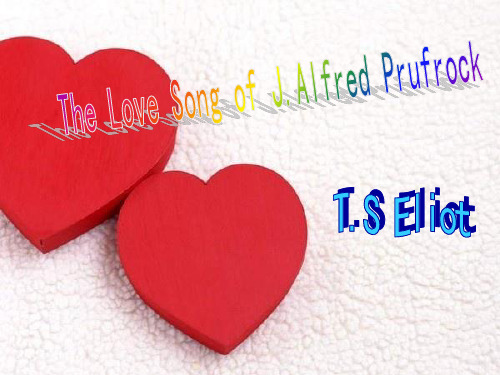
Curled once about the house, and fell asleep. 它溜下台阶,忽地纵身跳跃,于是便在房子附近蜷伏起来安睡。
And indeed there will be time 呵,确实地,总会有时间
Let us go then, you and I, 那么我们走吧,你我两个人,
When the evening is spread out against the sky 正当朝天空慢慢铺展着黄昏
Like a patient etherized upon a table; 好似病人麻醉在手术桌上;
Let us go, through certain half-deserted streets, 我们走吧,穿过一些半清冷的街,
The muttering retreats 那儿休憩的场所正人声喋喋;
Of restless nights in one-night cheap hotels 有夜夜不宁的下等歇夜旅店
For the yellow smoke that slides along the street, 看黄色的烟沿着街滑行,
Rubbing its back upon the window-panes; 在窗玻璃上擦着它的背;
There will be time, there will be time 总会有时间,总会有时间
Oh, do not ask, “What is it?“ 唉,不要问,“那是什么?”
Let us go and make our visit. 让我们快点去作客。
In the room the women come and go 在客厅里女士们来回地走, Talking of Michelangelo. 谈着画家米开朗基罗。
The Love Song of Prufrock及翻译
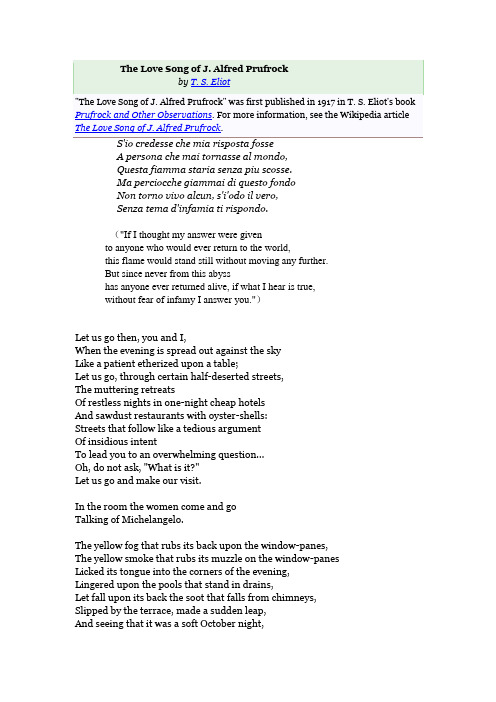
A persona che mai tornasse al mondo,Questa fiamma staria senza piu scosse.Ma perciocche giammai di questo fondoNon torno vivo alcun, s'i'odo il vero,Senza tema d'infamia ti rispondo.("If I thought my answer were givento anyone who would ever return to the world,this flame would stand still without moving any further.But since never from this abysshas anyone ever returned alive, if what I hear is true,without fear of infamy I answer you.")Let us go then, you and I,When the evening is spread out against the skyLike a patient etherized upon a table;Let us go, through certain half-deserted streets,The muttering retreatsOf restless nights in one-night cheap hotelsAnd sawdust restaurants with oyster-shells:Streets that follow like a tedious argumentOf insidious intentTo lead you to an overwhelming question…Oh, do not ask, "What is it?"Let us go and make our visit.In the room the women come and goTalking of Michelangelo.The yellow fog that rubs its back upon the window-panes, The yellow smoke that rubs its muzzle on the window-panes Licked its tongue into the corners of the evening, Lingered upon the pools that stand in drains,Let fall upon its back the soot that falls from chimneys, Slipped by the terrace, made a sudden leap,And seeing that it was a soft October night,Curled once about the house, and fell asleep.And indeed there will be timeFor the yellow smoke that slides along the street, Rubbing its back upon the window-panes;There will be time, there will be timeTo prepare a face to meet the faces that you meet;There will be time to murder and create,And time for all the works and days of handsThat lift and drop a question on your plate;Time for you and time for me,And time yet for a hundred indecisions,And for a hundred visions and revisions,Before the taking of a toast and tea.In the room the women come and goTalking of Michelangelo.And indeed there will be timeTo wonder, "Do I dare?" and, "Do I dare?"Time to turn back and descend the stair,With a bald spot in the middle of my hair—[They will say: "How his hair is growing thin!"]My morning coat, my collar mounting firmly to the chin, My necktie rich and modest, but asserted by a simple pin—[They will say: "But how his arms and legs are thin!"]Do I dareDisturb the universe?In a minute there is timeFor decisions and revisions which a minute will reverse. For I have known them all already, known them all—Have known the evenings, mornings, afternoons,I have measured out my life with coffee spoons;I know the voices dying with a dying fallBeneath the music from a farther room.So how should I presume?And I have known the eyes already, known them all—The eyes that fix you in a formulated phrase,And when I am formulated, sprawling on a pin,When I am pinned and wriggling on the wall,Then how should I beginTo spit out all the butt-ends of my days and ways?And how should I presume?And I have known the arms already, known them all—Arms that are braceleted and white and bare[But in the lamplight, downed with light brown hair!]Is it perfume from a dressThat makes me so digress?Arms that lie along a table, or wrap about a shawl.And should I then presume?And how should I begin?. . . . .Shall I say, I have gone at dusk through narrow streetsAnd watched the smoke that rises from the pipesOf lonely men in shirt-sleeves, leaning out of windows? …I should have been a pair of ragged clawsScuttling across the floors of silent seas.. . . . .And the afternoon, the evening, sleeps so peacefully!Smoothed by long fingers,Asleep… tired… or it malingers,Stretched on the floor, here beside you and me.Should I, after tea and cakes and ices,Have the strength to force the moment to its crisis?But though I have wept and fasted, wept and prayed,Though I have seen my head [grown slightly bald] brought in upon a platter, I am no prophet—and here's no great matter;I have seen the moment of my greatness flicker,And I have seen the eternal Footman hold my coat, and snicker,And in short, I was afraid.And would it have been worth it, after all,After the cups, the marmalade, the tea,Among the porcelain, among some talk of you and me,Would it have been worth while,To have bitten off the matter with a smile,To have squeezed the universe into a ballTo roll it toward some overwhelming question,To say: "I am Lazarus, come from the dead,Come back to tell you all, I shall tell you all"—If one, settling a pillow by her head,Should say: "That is not what I meant at all.That is not it, at all."And would it have been worth it, after all,Would it have been worth while,After the sunsets and the dooryards and the sprinkled streets,After the novels, after the teacups, after the skirts that trail along the floor—And this, and so much more?—It is impossible to say just what I mean!But as if a magic lantern threw the nerves in patterns on a screen:Would it have been worth whileIf one, settling a pillow or throwing off a shawl,And turning toward the window, should say:"That is not it at all,That is not what I meant, at all.". . . . .No! I am not Prince Hamlet, nor was meant to be;Am an attendant lord, one that will doTo swell a progress, start a scene or two,Advise the prince; no doubt, an easy tool,Deferential, glad to be of use,Politic, cautious, and meticulous;Full of high sentence, but a bit obtuse;At times, indeed, almost ridiculous—Almost, at times, the Fool.I grow old… I grow old…I shall wear the bottoms of my trousers rolled.Shall I part my hair behind? Do I dare to eat a peach?I shall wear white flannel trousers, and walk upon the beach.I have heard the mermaids singing, each to each.I do not think that they will sing to me.I have seen them riding seaward on the wavesCombing the white hair of the waves blown backWhen the wind blows the water white and black.We have lingered in the chambers of the seaBy sea-girls wreathed with seaweed red and brownTill human voices wake us, and we drown.Retrieved from"/wiki/The_Love_Song_of_J._Alfred_Prufrock"J·阿尔弗瑞德·普鲁弗洛克的情歌假如我认为,我是回答一个能转回阳世间的人,那么,这火焰就不会再摇闪。
浅析《J·阿尔弗雷德·普鲁弗洛克的情歌》及其现实意义

T . s . 艾 略特是世界闻名 的英 国诗人 、 剧作家 、
文学 评论 家 、 现代 派诗 歌 运 动领 袖 。艾 略特 于 1 8 8 8
《 情歌》 ) 。这部作 品被美国著名诗人埃兹拉 ・ 庞德 赞为“ 我 所读 过 的一个 美 国人 写 的 最好 的诗 篇 ” ’ , 《 不列颠百科全书》 评论《 情歌》 是“ 意象派英语诗歌
敦, Байду номын сангаас 9 2 7年 , 艾 略特 正式 加入英 国国籍 。 诺 贝尔 文学 奖 。瑞典 皇 家学 院在 为其颁 奖 时作 出这 样 的评 价 : “ 艾 略特 作 为一 个 诗 人 , 对 同时代 人 和 年 轻 同行 的影 响 , 也许 要 比我 们 这 个 时 代 任何 一 个 人 都深远。 ” … 加 拿 大 著 名评 论 家 弗 莱 也 曾说 过 : “ 对
・
7 6・
容, 反复询问 “ 我可有勇气? ” , 好像有一种并未明说 的内心想 法 留给读 者 去猜测 、 回味 。 不同于其他情诗的直抒胸臆与对意 中人抑制不 住 的赞美 , 艾略特的《 情歌》 中充满了许多初看起来 无太多联系 , 但 细细品味后 有着深刻用 意的意象 。 《 情歌》 开头引用 了意大利文艺复兴时期但 丁的代
表露 的空 白部分。初读这首《 情歌》 , 主人公普鲁弗 洛克 给读 者 的感觉 是一 位 头 “ 有点秃” , 四肢 消瘦 的
中年知识 分 子形 象 , 佩 带一 条 “ 雅致而多彩的” 象 征
上流社会人士的领带。似乎他想借助情歌向一位女
士 吐露爱 情 , 但最 终他 也没 有真 正表 白 , 整首 诗 中读 者并 未看 到振 奋人 心 的爱 恋 和 浪 漫 的 激情 , 他好 像
《J.阿尔弗雷德·普鲁弗洛克的情歌》的认知文体分析
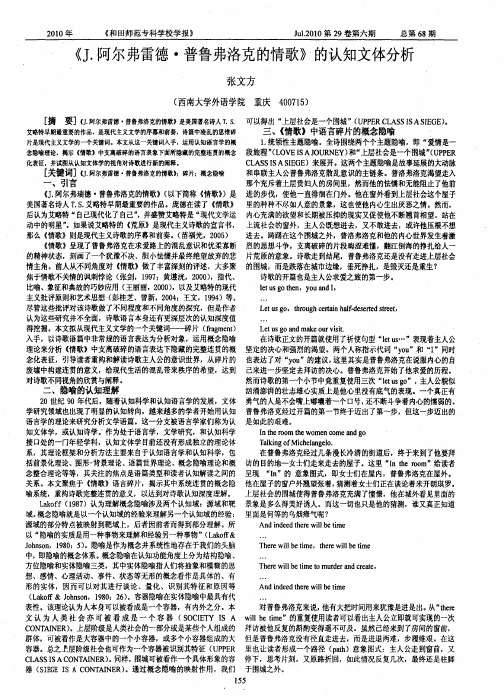
三、‘ 情歌》中语言碎片的概念隐喻
1统领性主题隐喻。全诗围绕两个个主题隐喻,即 “ . 爱情是一 念隐喻理论,揭示 ‘ 情歌)中支离破碎的语言表象下面所隐藏的完整连贯的概念 段旅程”L V AJ u N Y) 上层社会是一个围城"U P R ( O EI O R E 和“ S (PE 化袭征,并试图从认知文体学的视角对诗歌进行新的阐释 。 C A SI E E L S AS G )来展开。这两个主题隐喻是故事延展的大动脉 S I L 键 词 J‘。 尔弗雷德 ‘ 夫 J阿 普鲁弗 洛克的 情歌》 碎片; 概念隐喻 和串联主人公普鲁弗洛克散乱意识的主链条。普洛弗洛克渴望走入 引言 那个充斥着上层贵妇人的房间里,然而他的怯懦和无能阻止了他前 《. J阿尔弗瑞德 ・ 普鲁弗洛克的情歌》( 以下简称 《 情歌》 )是 进的步伐,使他一直徘徊在f ̄ 。他在窗外看到上层社会这个屋子 -l J" 美国著名诗人 TS艾略特早期最重要的作品。庞德在读了 《 .. 情歌》 里的种种不尽如人意的景象,这也使他内心生出厌恶之情。然而, 后认为艾略特 “自己现代化了自己” ,并盛赞艾略特是 “ 现代文学运 内心充满的欲望和长期被压抑的现实又促使他不断翘首相望。站在 动中的明星” 。如果说艾略特的 《 荒原》是现代主义诗歌的宣言书, 上流社会的窗外,主人公既想进去,又不敢进去,或许他压根不想 那么 《 情歌》则是现代主义诗歌的序幕和前奏。( 苗福光,20 ) 0 5 进去。踌躇在这个围城之外,普洛弗洛克和他的内心世界发生着激 《 情歌》呈现了普鲁弗洛克在求爱路上的混乱意识和优柔寡断 烈的思想斗争,支离破碎的片段晦涩难懂,翻江倒海的挣扎给人一 的精神状态,刻画了一个犹豫不决、胆小怯懦并最终绝望放弃的悲 片荒原的意象。诗歌走到结尾,普鲁弗洛克还是没有走进上层社会 情主角。前人从不同角度对 《 情歌》做了丰富深刻的评述,大多聚 的围城,而是跌落在城市边缘,垂死挣扎,是毁灭还是重生? 焦于情歌不关情的讽刺悖论 ( 张剑,19 ;黄遵洗,20 ) 97 00 ,指代、 诗歌的开篇也是主人公求爱之旅的第一步。 l U ote ,y ua dI e S t g h n o n , 比喻、象征和典故的巧妙应用 ( 王丽丽,20 ) 00 ,以及艾略特的现代 主义批评原则和艺术思想 一 ( 彭桂芝、曾新,20 ;王文,19 )等。 04 94 L t sg ,tr u hc r i af ee e t e , e o h o g et nh l d s r dsr t u a - t e 尽管这些批评对该诗歌做了不同程度和不同角度的探究,但是作者 认为这些研究并不全面,诗歌语言本身还有更深层次的认知深度值 L t S oa d ma eo r ii e k u v s . Ug n t 得挖掘。本文拟从现代主 义文 学的一个关键词—— 碎片 (r m n) f g et a 入手,以诗歌语篇中非常规的语言表达为分析对象,运用概念隐喻 在诗歌正文的开篇就使用了祈使句型 “ t S l …”表现着主人公 eU 理论来分析 《 情歌》中支离破碎的语言表达下隐藏的完整连贯的概 坚定的决心和强烈的渴望。两个人称指示代词 “ o ”和 “ ”同时 yu I 念化表征,引导读者重构和解读诗歌主人公的意识世界,从碎片的 也表达了对 “ o ”的建议, yu 这里其实是普鲁弗洛克在说服内心的自 废墟中构建连贯的意义,给现代生活的混乱带来秩序的希望,达到 己来进一步坚定去拜访的决心。普鲁弗洛克开始了他求爱的历程。 对诗歌不同视角的欣赏与阐释。 然而诗歌的第一个小节中竟重复使用三次 “ tS o 主人公貌似 l ”, eU g 二、隐喻的认知理解 汹涌澎湃的壮志雄心实质上是他心里没有底气的表现。一个真正有 2 O世纪 9 O年代后,随着认知科学和认知语言学的发展,文体 勇气的人是不会嘴上嘟囔着一个1号, 2 还不断斗争着内心的懦弱的。 1 学研究领域也出现了明显的认知转向,越来越多的学者开始用认知 普鲁弗洛克经过开篇的第一节终于迈出了第一步,但这一步迈出的 语言学的理论来研究分析文学语篇。这一分支被语言学家们称为认 是如此 的艰难。 知文体学,或认知诗学。作为处于语言学,文学研究,和认知科学 ‘ I h o tewo nc mea dg nter m h o me o n o T li g f c ea g l. ak n Mih ln eo o 接口处的- 1年轻学科,认知文体学 目前还没有形成独立的理论体 -' 7 系,其理论框架和分析方法主要来自于认知语言学和认知科学,包 在普鲁弗洛克经过几条漫长冷清的街道后,终于来到了他要拜 括前景化理论、图形一 背景理论、 语篇世界理论、 概念隐喻理论和概 访的 目的地一女士们走来走去的屋子。这里 “nt o m"给读者 I el h o 念整合理论等等,其关注的焦点是语篇类型和读者认知解读之间的 呈现 “n l”的 意象图式,即女士们在屋内,普鲁弗洛克在屋外。 关系。本文聚焦于 《 情歌》语言碎片,揭示其中系统连贯的概念隐 他在屋子的窗户外翘望张着, 猜测着女士们正在谈论着米开朗琪罗。 喻系统,重构诗歌完整连贯的意义,以达到对诗歌认知深度理解。 上层社会的围城使得普鲁弗洛克充满了僮憬,他在城外看见里面的 Lkf 18 )认为理解概念隐喻涉及两个认知域:源域和靶 景象是多么得美好诱人。而这一切也只是他的猜测,谁又真正知道 aof(9 7 域。 概念隐喻就是以一个认知域的经验来理解另一个认知域的经验: 里面是何等的乌烟瘴气呢? 源域的部分特点被映射到靶域上,后者因前者而得到部分理解。所 An d e ee lb me di e dt r l ct n h wi i 以“ 隐喻的实质是用一种事物来理解和经验另一种事物”( ao & Lkf T ee lb me teewi et h r l et , h r lb me wi i I i Jhsn 90 ) ono,18:5 。隐喻是作为概念并系统性地存在于我们的头脑 中,即隐喻的概念体系。 概念隐喻在认知功能角度上分为结构隐喻、 T e e lb i t h r wi et 1 me omu d r dc ae r e a r t , n e 方位隐喻和实体隐喻三类,其中实体隐喻指人们将抽象和模糊的思 想、感情、心理活动、事件、状态等无形的概念看作是具体的、有 An d e e lb me di e dt r wi et n he l i 形的实体,因而可以对其进行谈论、量化、识别其特征和原因等 ( ao & Jhsn 9 0 6 。容器隐喻在实体隐喻中最具有代 Lkf ono ,18:2 ) 表性。该理论认为人本身可以被看成是一个容器,有内外之分。本 对普鲁弗洛克来说, 他有大把时间用来犹豫是进是出。 te 从“ r h e 文认 为人 类 社 会 亦 可被 看 成 是 一 个 容 器 ( O IT S A wlb t e S CE Y I i ei ”的重复使用读者可以 l m 看出主人公立即就可实 现的一次 C N ANE ) O T I R 。上层阶级是人类社会的一部分或是某些个人组成的 拜访被他反复的斟酌变得遥不可及。虽然已经来到了房间的窗前, 群体,可被看作是大容器中的一个小容器,或多个小容器组成的大 但是普鲁弗洛克没有径直走进去,而是进退两难,步履维艰。在这 容器。总之上层阶级社会也可作为一个容器被识别其特征 ( PE 里也让读者形成一个路径 (a )意象图式:主人公走到窗前,又 U PR pt h C AS O E ) 同样, L SS C N IA R。 围城可被看作一个具体形象的容 停下,思考片刻,又原路折回,如此情况反复几次,最�
- 1、下载文档前请自行甄别文档内容的完整性,平台不提供额外的编辑、内容补充、找答案等附加服务。
- 2、"仅部分预览"的文档,不可在线预览部分如存在完整性等问题,可反馈申请退款(可完整预览的文档不适用该条件!)。
- 3、如文档侵犯您的权益,请联系客服反馈,我们会尽快为您处理(人工客服工作时间:9:00-18:30)。
《J. 阿尔弗雷德・普鲁弗洛克的情歌》 赏析 The analysis of the theme in“The Love Song of J. Alfred Prufrock”
◎马
(华中师范大学
琳
430079)
湖北・武汉
Abstract This paper aims at providing some information on the comprehension and appreciation of "The Love Song of J. Alfred Prufrock" by T.S.Eliot. In a form of dramatic monologue, the poet draws us a picture of an evasive hellish world through Prufrock’ s meditation over the business of the suggested marriage proposal. The theme of the poem can be explored by the analysis of Prufrock’ complicated psychological activities. The paralysis of Prufrock can be obviously shown through this 140-line poem. s Key words morbid world paralysis disillusionment
130
2008 年第
4期
安徽文学
艺 术 殿 堂
him from mental torture, after all he still has to come back to face the reality. He is mentally dead. The theme of the poem can be explored by analyzing Prufrock’ psychological journey. From the beginning to the end of s the poem, Prufrock experiences a complicated psychological journey. He experiences seven mental changes. From stanza 1 to 3, Prufrock doesn’have courage to express his love to the womt an that he loves. Expressing any kind of affection to her is awkward and difficult. He has mentality of diffidence. From stanza 4 to 5, Prufrock pretends that he has time to express his love. He has mentality of pretence. From stanza 6 to 9, Prufrock always ask questions. These questions indicate his uncertainty about whether he should express his love and how to express his love. He is unsure of what to do and afraid to commit to any particular choice of action. He has mentality of uncertainty. From stanza 10 to 11, Prufrock has strong eagerness to take action. It seems that he has gathered full courage to express his love to his lover. He has mentality of eagerness. From stanza 12 to 15, he has mentality of self-debasement. From stanza 16 to 19, Prufrock imagines that he lives in his fantasy. Living in the fantastic world freed from worries is a pleasant daydream for Prufrock. He imagines the peaceful world under the sea playing with mermaids merrily. He has mentality of fantasy. Stanza 20 describes the images of mermaids. The mermaids are symbols of vitality, youth and life, which is absent in both modern world and Prufrock. The mermaids evoke a more mysterious and imaginative world. And although he can imagine the mermaids are singing, he presumes that they can never sing to him. And the images convey Prufrock’ longing for beauty and love, but the poem returns to the s human voices and wakes him from fantasy. The sea represents reality, for the mermaids it is a life giving sea, but to Prufrock , he drowned into the modern world which is death in life. His only happiness can be found in daydreams and can be destroyed easily . He has mentality of disillusionment. After so many times of thinking and hesitation, finally his dream of expressing his love to his lover was broken because of his mental paralysis. The theme of the poem can be analyzed from the aspect of the linguistic form. The whole poem includes a lot of repetition of stanzas, questions, sentences and sentence structures. It obviously represents Prufrock’ hesitation and spiritual paralysis. s Eg. 1. So how should I presume? 2. How should I begin? 3. And indeed there will be time. 4. I grow old…I grow old. ming question also leads the readers to the internal world of Prufrock. i.e., his romantic dreams about ladies, his boredom of the trivial life, his wishes to change, his visions and revisions of plans, his hesitation, his fears of formulations of various types, etc. Prufrock is paralysed. Paralysis means the incapacity to act. Prufrock's paralysis is whether he should "dare to eat a peach" in front of high-society women. Prufrock's paralysis roots itself in the poem's structure. Sentence 3 shows he keeps insisting that there will be time to do many things in the social world. His eternal dilemma is characterized by his belief that there will be time to consider everything. Sentence 4 shows Prufrock's greater anxiety about the future and aging. Already characterized as having lost the luster of youth (and pathetically trying to approximate the bohemian style of rolling his trousers in order to make himself look younger), the only thing Prufrock marches toward decisively is death. Prufrock seems already in his own nightmarish afterlife. When Prufrock says that he has seen the eternal Footman holding his coat and laughing means he knows that he is reaching near the end of his life. In the poem, Prufrock urges his lady to accept him and to be together with him while they are still young and alive. However, it is only his illusions. "And indeed there will be time" reinforce his fixation on paralysis. He always attends the social gatherings with the hope of finding his lover. He wants to ask a woman to dance, or catch someone's eye. But he fails. He knows he is eligible enough to interest a woman, but his inner world won't allow him to risk a moment of expressing his love despite his raging desires. The ladies are young, as the references to "White" and "bare" indicate he is no longer young. Prufrock simultaneously plans his approach and tells himself that he can put off the action. Deciding not to try, Prufrock questions whether his effort is meaningful. He excuses his fear by rationalizing that his speaking to the lady will not achieve any real response. Generally speaking, Eliot presents a vivid picture of Prufrock’ life in front of the readers through Prufrock’ eyesight s s and internal world. Readers are deeply impressed by his mentality: his conflict with mental torture, his looking forward to the climax of love, his fear of love, his trouble of indecision, selfcomforting, self-escaping and self-excusing. From the aspect of his paralyzed desire and sticktiveness in his life, we can infer that the society he lives in seems to be normal superficially, but actually people who live in it are suffering from a kind of spiritual death. Profrock seems to be a doomed tragic figure, but it is not an individual’ tragedy, it is the tragedy of a generation, a tras gedy of human civilization. To some extent, the psycho-analysis
